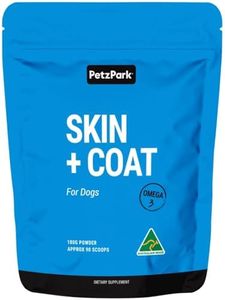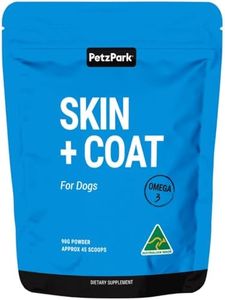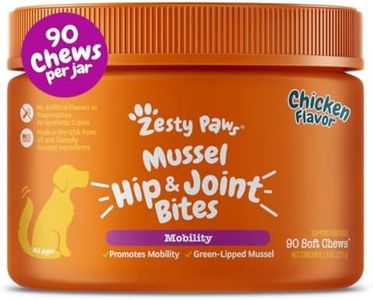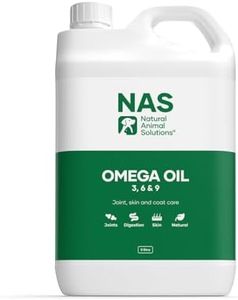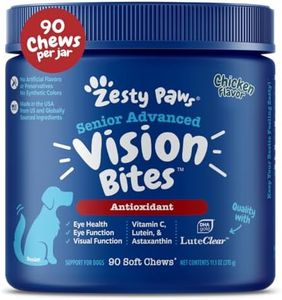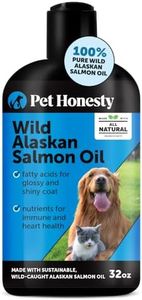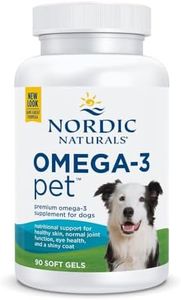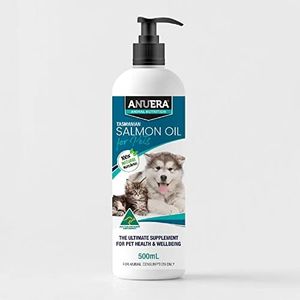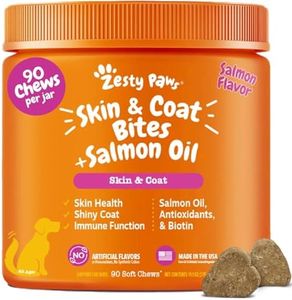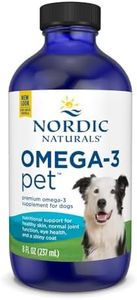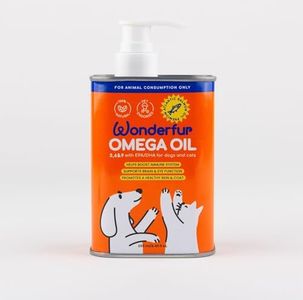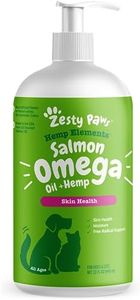We Use CookiesWe use cookies to enhance the security, performance,
functionality and for analytical and promotional activities. By continuing to browse this site you
are agreeing to our privacy policy
10 Best Omega 3 For Dogs
From leading brands and best sellers available on the web.By clicking on a link to a third party's website, log data is shared with that third party.
Buying Guide for the Best Omega 3 For Dogs
Choosing the right omega-3 supplement for your dog can make a difference in their overall health, from supporting a shinier coat to helping with joint, heart, and brain health. When selecting a supplement, it's important to understand the main features that matter so you can tailor your choice to your dog's specific needs. Remember, not all supplements are the same, and what works for one dog may not be the ideal choice for another. Read the label, consider your dog's age, size, health concerns, and always consult your vet for tailored advice.Source of Omega-3Omega-3s for dogs usually come from fish oil (such as salmon or sardines), krill oil, or plant-based sources like flaxseed. The source is important because not all omega-3s are equal—marine sources provide EPA and DHA, which are most beneficial for dogs. Plant sources mostly offer ALA, which doesn’t convert as efficiently in dogs. If your dog needs support with skin, joints, or cognitive function, then marine oils with EPA and DHA are generally better. For mild support or plant-based diets, ALA sources could suffice, but they may be less effective.
EPA and DHA ContentEPA (Eicosapentaenoic Acid) and DHA (Docosahexaenoic Acid) are the most crucial omega-3 components for dogs. The amount of EPA and DHA is usually listed in milligrams per serving. Higher EPA/DHA levels offer more potent support for inflammation, skin health, and cognitive benefits, but may be more than needed for everyday well-being. Lower amounts may be fine for preventative care but less effective for treating specific conditions. Look for a supplement that matches your dog’s needs: higher content for active, senior, or dogs with health issues, and lower for general maintenance.
Form of SupplementOmega-3 for dogs can come in liquid, softgel, chew, or powder forms. Liquid forms make it easy to mix with food, softgels or capsules might be easier for larger dogs, while chews and powders are typically designed to be more palatable. Choose the form that best fits your dog’s eating habits and your ease of administration—picky eaters might prefer flavored chews, while some dogs don’t mind liquids. The right form makes daily supplementation simple and stress-free.
Purity and SafetySafety and purity are crucial because you want to avoid toxins like mercury or heavy metals that can sometimes be found in poorly filtered fish oils. Look for supplements that mention third-party testing or certifications for purity, or those that explicitly state they are free from contaminants. This is especially important for dogs with sensitivities or if you plan on long-term use. Opting for a product with clear safety standards helps ensure your pet’s well-being.
Additives and FlavoringsSome omega-3 supplements include flavorings or other additives to make them more appealing to dogs, while others keep it plain. While flavorings can help with palatability, some dogs have food sensitivities or dietary restrictions. If your dog is sensitive or on a special diet, look for a supplement with minimal and natural ingredients. For dogs that are picky or hesitant, a product with safe, natural flavorings could help encourage regular use.

